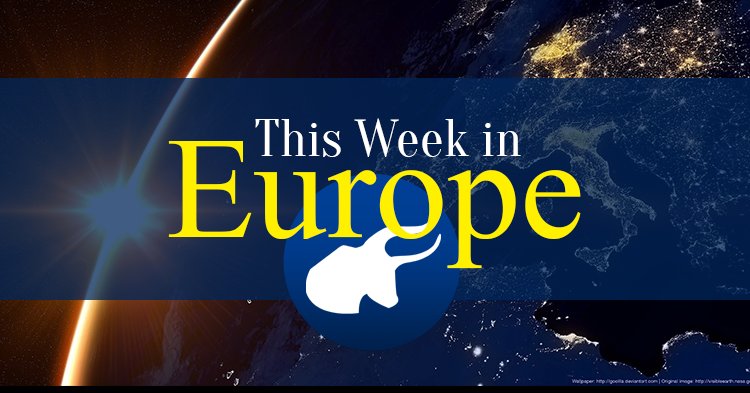EU: two-state solution in Israel-Palestine
On Thursday, EU leaders debated the recognition of Jerusalem as Israel’s capital by American president Donald Trump. Donald Tusk, president of the European Council, concluded that the EU is committed to a two-state solution with regard to Israel and that “the EU position on Jerusalem remains unchanged.” Earlier in the week, Israeli PM Benjamin Netanyahu tried to convince EU foreign ministers to accept Jerusalem as his state’s capital. He also stated that peace talks with the Palestinians would be successful only if they gave up on having a shared capital in Jerusalem.
Brexit: Parliamentary humiliation, “sufficient progress” for May
The British Parliament continued to debate the EU Withdrawal Bill this week, and to vote on amendments. The government has managed to ward off other amendments to the text, but on Wednesday, 11 Conservative MPs rebelled against the government to help pass an amendment ensuring a binding parliamentary vote on the Brexit deal. The amendment was celebrated by Remainers who believed it would improve the chances of scrapping Brexit altogether. Meanwhile, visibly irritated Brexiteers asserted that the choice would merely be between leaving the EU with or without the deal.
After Wednesday’s parliamentary defeat, Prime Minister Theresa May gained a success in the European Council as EU27 leaders confirmed that “sufficient progress” was made on questions such as the ‘divorce bill’ and the Northern Irish border, so that trade talks can proceed. However, as ever, thorny questions remain in many fields, including Northern Ireland.
PESCO kicks off
On Monday, 25 EU member states agreed to the establishment of PESCO, or the Permanent Structured Cooperation. PESCO enhances investments in defence equipment and technologies and has identified 17 projects to begin with. The UK, Denmark and Malta did not participate in the agreement.
70 MEPs to join Macron’s “Refounding Europe”
Gilles Pargneaux of France, Enrique Calvet-Chambon of Spain and Luxembourgish Claude Turmes are only some of the MEPs that are looking to found a new movement. In total, the group said to support the French president in the EP amounts to 70. The attempt is aided by the cracks within the French Socialist delegation to the European Parliament, with MEPs divided among Benoît Hamon, Francois Hollande and Jean-Luc Mélenchon.
EU renews sanctions on Russia
On Thursday, EU leaders met and agreed on a 6-month extension of the sanctions on Russia. Introduced in 2014 after the annexation of Crimea and the conflicts in Ukraine, the sanctions affect economic domains such as banking, arms trade, sensitive technologies, and also include asset freezes and travel bans for high-ranking Russian officials.
20 ‘European Universities’ by 2024
In order to increase the international competitiveness of the higher education sector of Europe, EU leaders agreed to establish 20 ‘European Universities” by 2024. Students would also benefit from increased mobility with a ‘European Student Card’, combining studies in several EU countries.
EU and US want to cut UN budget
The United States, which provides 22% of the core budget of the United Nations, advanced a $250 million cut to the 2018-2019 period, adding to the $200 million already proposed by the UN Secretary-General. The EU is also pursuing a smaller cut of $170 million. The cuts to the operating budget come in the context of an attempt to reform the UN bureaucracy, after the peacekeeping budget was cut by $600 million this year due to pressures from US President Donald Trump.
EU agrees clampdown on bitcoin platforms to tackle money laundering
An agreement on stricter rules for exchange platforms for bitcoin and other virtual currencies has been made by the EU legislators. Stricter controls on pre-paid cards and increased transparency requirements for the owners of trusts and companies were also a part of it. In the words of Europe’s Justice Commissioner Věra Jourová, this “will bring more transparency to improve the prevention of money laundering and to cut off terrorist financing.” It took the EU legislators and states more than a year to reach such an agreement as some member states feared that increased transparency on trusts and companies would have a negative impact on their economies.
Ukrainian judge frees Saakashvili from detention
The former president of Georgia, Mikheil Saakashvili, was released from detention. Prosecutors requested to place him under house arrest during investigation of accusations of Saakashvili assisting a criminal organisation. The requests were declined by a Ukrainian judge on Monday. After the ruling, Saakashvili announced that he would continue his political work in Ukraine.
Austrian conservatives bring far right into government
After the victory in the parliamentary elections, the leaders of the dominant parties Austrian Sebastian Kurz (OVP) and Heinz-Christian Strache (FPO) struck a coalition deal to share power. Kurz is set to head the government as chancellor and the OVP will have eight ministries including his office. Kurz’s office will have a greater control over EU matters given that it will take over some European departments from the foreign ministry. Strache was agreed to take the position of vice chancellor and the FPO were given six ministries. According to Kurz, his government will be pro-European despite including the FPO – a party founded by former Nazis and campaigning against Austria joining the EU. The coalition also plans to make referendums more widely available.
Incumbent Niinistö enjoys popularity ahead of Finnish presidential elections
Finland will elect its President for the next six-year term in late January and early February. In a televised debate on the public network this week, the incumbent Sauli Niinistö from the centre-right National Coalition Party performed best according to post-debate polls.
Niinistö’s monumental lead in the polls is expected to decrease with time, but at present, Finnish media continues to speculate whether he wins the election in the first round with more than 50% of the vote, or whether other contenders such as Pekka Haavisto from the Green Party or the independent anti-EU conservative Paavo Väyrynen can challenge Niinistö in the second round.


Follow the comments: |
|
